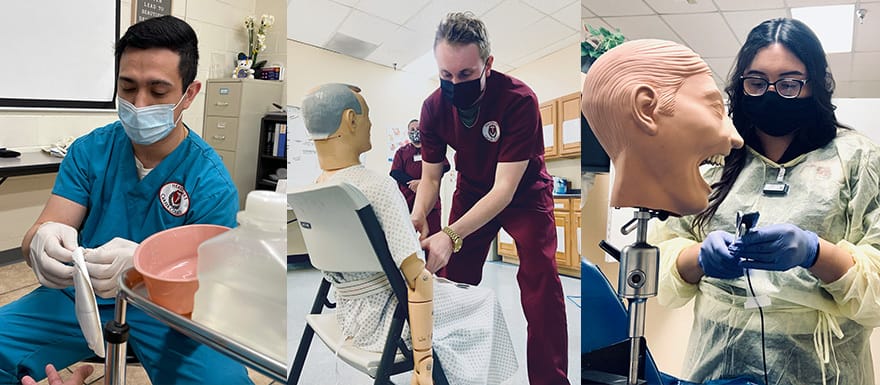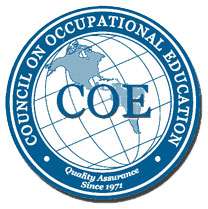
The healthcare field is one of the largest growing employment sectors in the world. As the world’s population grows, the need for healthcare services and healthcare professionals increases in demand. After the COVID-19 pandemic began, healthcare has never been more important. Staying healthy and safe is on the minds of all our community members and rightfully so. Healthcare professionals are needed in all parts of healthcare from long-term care facilities to hospitals.
If you are reading this you may be interested in being a part of something bigger and you are thinking about pursuing a career in healthcare, but you have questions that we may be able to help answer. Understanding what to expect, how to start, or where to look can help you find the right healthcare career path for you. Many of the following frequently asked questions will briefly cover topics such as; How to enroll into a healthcare career program? What are the schedules like in a healthcare career program? And how long are healthcare career programs? If you are interested in starting a career in healthcare then follow along as we go over some frequently asked questions.
Frequently Asked Questions
Do I need experience to work in healthcare?
No. Most healthcare careers can be completed with little to no experience. The knowledge and practical skills will be taught through an intensive healthcare career program. A small category of healthcare careers is encouraged to have some previous medical experience, but is not mandatory, for example; healthcare administration. Many healthcare career programs only require a high school diploma, but there are ways you can obtain a GED while attending school, so this may be an option if you would like to enroll into a healthcare career program, but do not currently have a high school diploma.
How do I enroll into a healthcare career program?
Find a local community college, technical or vocational school that offers the healthcare career program you are interested in. Many schools have an official school website that offers live chat, email, telephone contact, or walk-in hours where you can inquire with them about what programs they offer. Schedule an appointment with the admissions department where they can offer additional information and even take you on a tour around the campus.
Are schools still open during the COVID-19 pandemic?
Yes. Many schools have taken the appropriate precautions prior to reopening their campuses. There are many healthcare career programs that are being offered online. Additionally, since many healthcare careers require some hands-on skills practice, hybrid programs are now available. Schools have new COVID-19 protocols put in place which can include; hand washing or hand sanitizing before entering class, completing COVID-19 questionnaires, and having temperatures taken upon arriving on campus to ensure students and staff members are taking the appropriate steps to prevent the spread of COVID-19.
What is a hybrid healthcare career program?
A hybrid healthcare career program is a mixture of online class meetings and on-campus skills learning. Students attend class following their regular schedule, but instead of meeting in class for in-person lectures, they will meet using some type of online meeting platform. Instructors will communicate with students, grade classwork and homework, and administer quizzes or tests. Students can ask questions, communicate with other classmates, and complete assignments online. When it comes to students learning their hands-on skills, they will meet at a specific time and date on campus where they will practice and learn new skills in a socially distanced environment. Hybrid healthcare career programs are common in today’s education system from elementary school to universities, students can complete school in a socially distanced manner.
What is the schedule of a healthcare career program like?
Healthcare career program schedules can vary depending on the institution. Programs can range from a traditional Monday through Friday schedule with an average of 4 to 6 hours of class time to less than two three-hour classes per week. If you are someone who requires a schedule that works around your lifestyle, then finding a school that offers a schedule that works for you would be the ideal option. There are schools that offer morning and evening programs as well. Morning programs can start as early as 8:00 am, while evening programs can start as late as 5:00 pm. Flexible healthcare career program schedules provide an individual with the opportunity to attend school while prioritizing family or work obligations that would otherwise hinder a person from pursuing their educational goals.
How long is a healthcare career program?
The length of a healthcare career program can vary depending on the institution and the type of healthcare career program you choose to enroll in. Additionally, the structure of a program can lengthen or shorten the amount of time you are in school for example; pursuing a career as a Medical Assistant can take up to twelve months, while a career as an Ultrasound Technician can take up to twenty-four months.
The difference in length when comparing different healthcare career programs takes into consideration the number of hours each program requires to be completed to be eligible to sit for their national or state credentialling exams. Also, if a program is considered advanced then the time in school can shorten, but students may be required to complete evaluations prior to graduation to ensure a student has been professionally trained. Take into consideration the length of a program and determine if you have the time and resources to be in school for that amount of time.
Is financial aid available to help with tuition costs?
Yes. Financial aid is available to those who qualify and may only require an online application. School can be expensive and students may think they cannot afford to enroll into a healthcare career program, but there are many financial aid resources that may lower or even pay a large percentage of your education expenses. There are free grants that is offered by the government and there are student loans available that students won’t need to pay back until six months after graduation. A large percentage of students utilize financial aid to pay for a portion or all of their education expenses, so they can make school their top priority. Although financial aid may not be an option for everyone, many schools offer payment plans that are affordable and unique to each student. Payment plans are calculated according to what you can afford and the amount of your school tuition. Check with the school you are interested in attending and ask about their financial aid options.
Is there an entrance exam to enroll into a healthcare career program?
Every school is different in the way they process enrollees and their acceptance policies. Some schools may only require an application and a high school diploma while others are extensive and may require prior college credits and an entrance exam. The type of healthcare program you are interested in also plays a part in the process of enrollment and what a school may require from students prior to enrollment for example; a dental assisting program may only require a high school diploma and a basic entrance exam, but a licensed vocational program may require prior medical terminology credits and an intensive entrance exam covering topics related to basic anatomy and physiology, etc.
It is important to ask an institution if they administer an entrance exam and what is covered, so you can prepare ahead of time. If a school has a limited number of seats due to high demand or capacity requirements, they may utilize entrance exams as a means to selecting a limited number of students to be accepted.
Do you need to pay for school supplies like; uniforms, books, and licensing exams?
Private technical and vocational schools commonly include books, uniforms, exam fees, and limited supplies into their school tuition. Traditional schools such as; community colleges, adult schools, and universities may not cover these supplies and are the student’s responsibility if they are not covered under their school tuition. It is important to check with the school you are interested in to see what is covered under your tuition and what will be an out-of-pocket expense.
Are there healthcare career programs that I can complete only online?
Yes. Online healthcare career programs are a great option for students who may have outside obligations and struggle to attend class on campus. Since the COVID-19 pandemic, schools have taken the initiative and started to offer online and hybrid class structures. Healthcare career programs such as Medical Biller and Coder and Healthcare Management are now offered completely online. Student now have the ability to pursue their educational goals in a socially distanced environment while having the option to complete their hands-on skills on campus.
Are employers still hiring during COVID-19?
Yes. Employers are still hiring and even higher in demand. Since the start of the COVID-19 pandemic healthcare careers are needed more than ever. There is a shortage among healthcare professional and employers are in need in all sectors of healthcare. Healthcare is one of the fastest growing employment sectors and continues to see growth even during a pandemic.
Questions About Healthcare Careers?
If you have additional questions about healthcare careers or healthcare career programs that we have not explained in the above frequently asked questions then visit healthcarecareercollege.edu and speak with an admissions representative to get started today!
Is a Rewarding Healthcare Career Right for You? Get More Info…
If you’re interested in learning more about careers in healthcare and exploring whether Healthcare Career College is right for you, fill out the form on this page to receive more information.
For immediate questions, call (562) 804-1239


